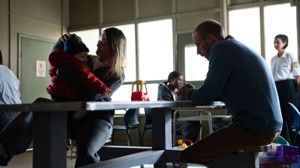The opening shot of Bruce McDonald's The Husband is clear: Maxwell McCabe-Lokos, the titular husband, is not in a good place. Hunched over, flinching away from eye contact. He seems like a nice enough guy, caring for his infant son, standing by his inmate spouse--it's only when we learn that her crime was sleeping with her 14 year-old student, Henry's demeanour suddenly makes perfect sense. Shortly before her release, as he struggles to cope with the damage inflicted on his life by his wife's actions, he spots the aforementioned 14 year-old. He is abruptly shaken from his stupor, and begins following the boy around, increasingly obsessed, as his life begins to unravel.
What struck me right away was the way, depending on Henry's state of mind, you contrasted action (or lack thereof) between foreground and background. Initially, as he drifts through his days shell-shocked and emasculated, he is stagnant. The world around him moves at a steady pace. Even when he walks or drives, there is a stillness to his presence. When he sees the boy and is jarred into action, triggering a frenzy of bad decisions, it's of a relief to see him become more animated. And to capture that relief, you change the depth of field; the action in the background slows down as his movements grow increasingly sharper and more erratic. This slow-speedy contrast goes back and forth throughout the film, and while it is an effective way of reflecting Henry's mood swings, it leads to a lack of momentum, or any sense of building up to something.
The film has a strong beginning, and a few compelling moments towards the end. I just wasn't feeling much of anything in between. It's never really clear what Henry is trying to accomplish, and, by extension, what the film is trying to tell us. Sure, there are a number of factors contributing to Henry's breakdown, but they could have been woven into the narrative more effectively. Instead, we have a scene where Henry lashes out at his coworkers, and much later, an awkward scene with his teenaged babysitter that seems to have been the result of someone suddenly remembering, "Oh right, we have yet to discuss the crippling blow to his masculinity."
It doesn't help that of Henry's two pivotal confrontations with the people responsible for his distress, one takes place too early, the other tool ate. If only McDonald and McCabe-Lokos (who co-wrote the screenplay with Kelly Marks) could have found the same balance between the foreground and background that you did. While there are some darkly funny moments, and a fine performance by McCabe-Lokos, there just wasn't enough depth and contrast to keep me engaged throughout.
Signing off,
Nat.







